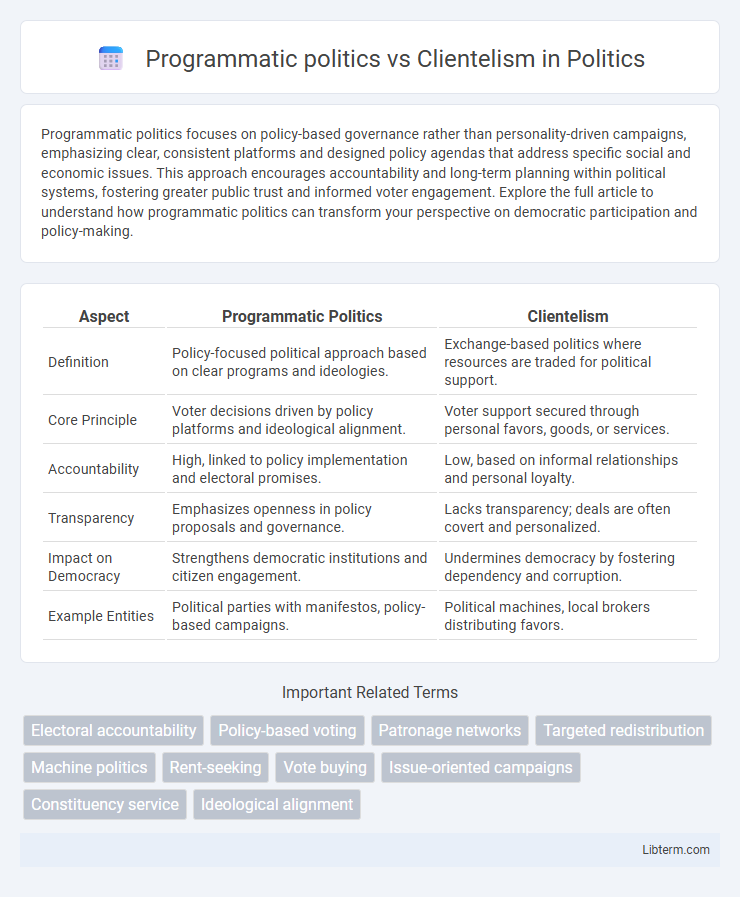Programmatic politics focuses on policy-based governance rather than personality-driven campaigns, emphasizing clear, consistent platforms and designed policy agendas that address specific social and economic issues. This approach encourages accountability and long-term planning within political systems, fostering greater public trust and informed voter engagement. Explore the full article to understand how programmatic politics can transform your perspective on democratic participation and policy-making.
Table of Comparison
| Aspect | Programmatic Politics | Clientelism |
|---|---|---|
| Definition | Policy-focused political approach based on clear programs and ideologies. | Exchange-based politics where resources are traded for political support. |
| Core Principle | Voter decisions driven by policy platforms and ideological alignment. | Voter support secured through personal favors, goods, or services. |
| Accountability | High, linked to policy implementation and electoral promises. | Low, based on informal relationships and personal loyalty. |
| Transparency | Emphasizes openness in policy proposals and governance. | Lacks transparency; deals are often covert and personalized. |
| Impact on Democracy | Strengthens democratic institutions and citizen engagement. | Undermines democracy by fostering dependency and corruption. |
| Example Entities | Political parties with manifestos, policy-based campaigns. | Political machines, local brokers distributing favors. |
Understanding Programmatic Politics
Programmatic politics emphasizes policy platforms based on consistent, transparent party ideologies aimed at broad voter interests rather than individual favors. It contrasts sharply with clientelism, where political support is exchanged for direct, personalized benefits, leading to patronage and potential corruption. Understanding programmatic politics requires analyzing how parties maintain accountability and promote institutionalized policy rather than transactional exchanges.
Defining Clientelism in Modern Politics
Clientelism in modern politics refers to a system where politicians provide material benefits or services to voters in exchange for political support, often undermining democratic principles by prioritizing loyalty over policy. This practice relies on personalized and reciprocal relationships rather than institutionalized, programmatic policy platforms focused on broad societal needs. Unlike programmatic politics, which emphasize issue-based campaigning and governance, clientelism perpetuates dependency and can erode transparency and accountability in political systems.
Historical Context of Political Strategies
Programmatic politics emerged in the mid-20th century as a strategy emphasizing policy-driven platforms and institutionalized party agendas, contrasting sharply with clientelism, which historically dominated through personalized exchanges and patronage networks in many developing democracies. Clientelism's roots trace back to colonial and early republican periods, where political loyalty was secured by direct material benefits rather than ideological alignment or policy performance. The shift towards programmatic politics reflects broader societal transformations including urbanization, the rise of mass media, and increased demands for accountability and transparency in governance.
Key Differences Between Programmatic Politics and Clientelism
Programmatic politics rely on policy-based platforms that offer voters clear, consistent agendas focused on public goods and long-term development, whereas clientelism depends on personalized exchanges of goods or services for political support. Unlike clientelism's informal and often opaque networks, programmatic politics emphasize transparency, accountability, and institutionalized party competition. The core difference lies in how votes are secured: programmatic politics seek ideological alignment and policy promises, while clientelism uses targeted benefits and patronage to mobilize support.
Advantages of Programmatic Approaches
Programmatic politics prioritize policy-driven governance based on transparent, consistent platforms that promote accountability and long-term development, contrasting with clientelism's focus on personalized exchanges and short-term favors. This approach encourages voter alignment with ideological stances and policy outcomes, enhancing democratic legitimacy and reducing corruption risks. Empirical studies demonstrate that programmatic strategies foster improved public service delivery and more equitable resource allocation, strengthening institutional trust and political stability.
The Impact of Clientelism on Democratic Processes
Clientelism undermines democratic processes by fostering unequal political participation and eroding accountability through personalized exchanges of goods or services for votes. Unlike programmatic politics, which emphasize policy platforms and voter preferences based on coherent agendas, clientelism incentivizes short-term loyalty rather than long-term policy commitment. This dynamic weakens democratic institutions, reduces electoral competitiveness, and perpetuates corruption, ultimately distorting representative democracy.
Case Studies: Successful Programmatic Campaigns
Programmatic politics rely on policy-driven campaigns emphasizing transparent governance and voter education, as demonstrated by the success of Mexico's MORENA party in the 2018 general elections. Unlike clientelism, which leverages patronage networks, programmatic campaigns like those in South Korea's 2017 presidential race prioritize issue-based platforms that mobilize urban middle-class voters. Studies from Brazil's 2014 municipal elections highlight how programmatic appeals foster sustained political engagement and reduce dependency on vote-buying mechanisms common in clientelist systems.
Clientelism: Risks and Long-term Consequences
Clientelism undermines democratic institutions by fostering dependency between voters and politicians through the exchange of goods or services for political support, which often leads to corruption and favoritism. This practice distorts public policy priorities, diverting resources towards short-term benefits for specific groups rather than broad societal development. Over time, clientelism erodes trust in governance, weakens state capacity, and perpetuates inequality and political instability.
Transitioning from Clientelism to Programmatic Politics
Transitioning from clientelism to programmatic politics involves shifting from personalized, vote-buying exchanges to policy-based, transparent governance systems that prioritize citizen needs and institutional accountability. Successful transitions depend on the strengthening of democratic institutions, enforcement of rule of law, and the mobilization of informed electorates demanding policy-oriented political platforms. Countries undergoing this shift often experience improved governance quality, higher electoral competition based on issues, and reduced corruption linked to personalized political exchanges.
Future Prospects for Political Systems Worldwide
Programmatic politics, characterized by policy-driven platforms and voter accountability, offers a sustainable foundation for democratic governance, promoting transparency and institutional trust. Clientelism, based on personalized exchanges and patronage networks, often undermines political stability and perpetuates corruption, limiting long-term development prospects. The future of political systems worldwide depends on strengthening programmatic frameworks while reducing clientelist practices to enhance governance quality and socio-political inclusivity.
Programmatic politics Infographic

 libterm.com
libterm.com